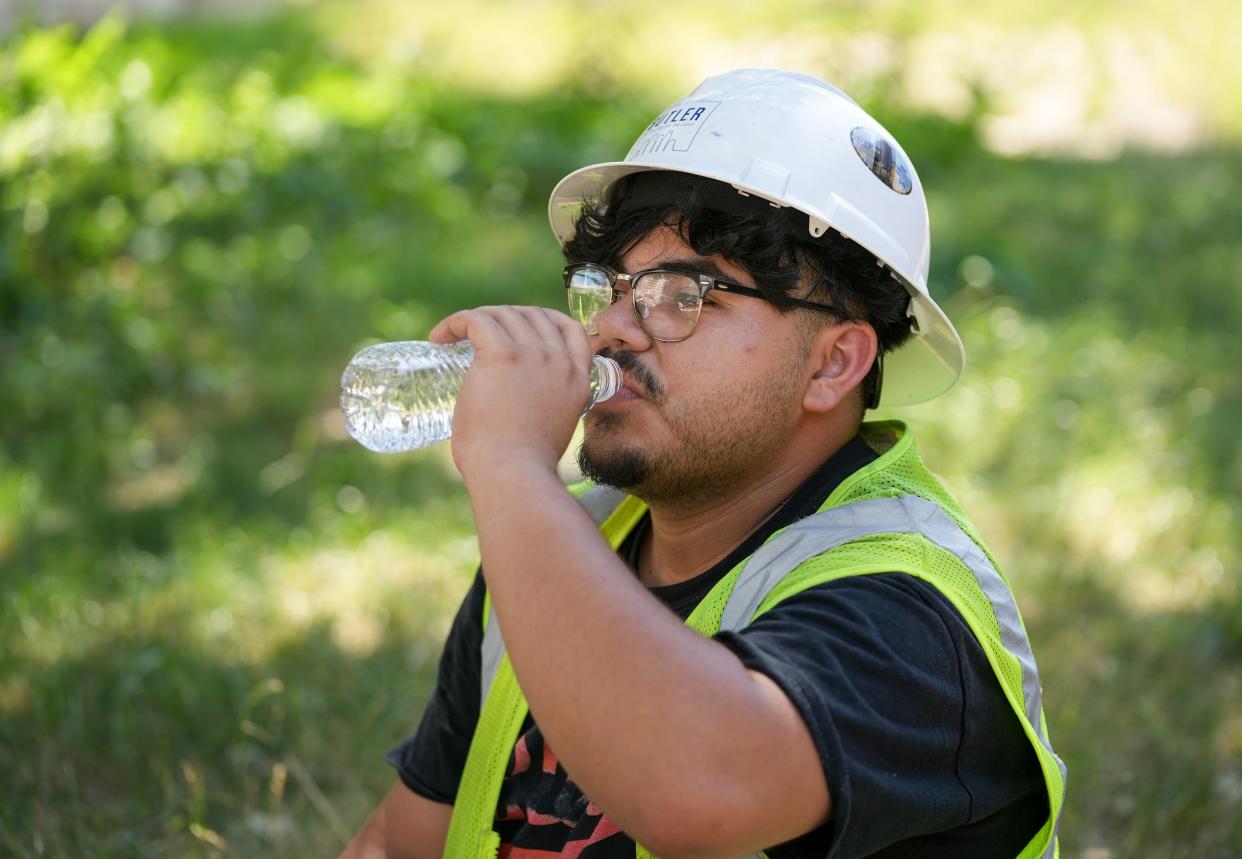Rep. Greg Casar calls for federal heat standard to guarantee outdoor workers water breaks

- Oops!Something went wrong.Please try again later.
- Oops!Something went wrong.Please try again later.
WASHINGTON — Austin Democratic U.S. Rep. Greg Casar joined acting Labor Secretary Julie Su on a video news call Thursday to push for a federal heat standard to ensure outdoor workers get periodic breaks for water and rest.
The call to action was prompted by a new Texas law, the so-called Death Star bill, that was set to take effect Friday but was struck down two days earlier by a district judge in Travis County, declaring it unconstitutional.
Still, Casar — who held a nine-hour “thirst strike” on the U.S. Capitol steps in July to protest the Texas law, which would overturn local rules ensuring water breaks — said Thursday that workers need a federal heat standard to guarantee safe working conditions.
Texas House Bill 2127 prohibits cities and counties from enacting or enforcing any ordinance inconsistent with state law under eight codes: Agriculture, Business & Commerce, Finance, Insurance, Labor, Natural Resources, Occupation and Property. Together, the codes cover more than 1,000 chapters.
More: Travis County judge rules HB 2127, the so-called Death Star bill, is unconstitutional
Attorneys for local governments argued in District Court on Wednesday that HB 2127 shifts the burden to cities and counties to show that a local law complies with state law as opposed to the state having to prove a direct conflict with state law. That shift would open a city or county to an avalanche of lawsuits that their lawyers couldn’t possibly handle, the cities argued. And, they added, it would be incredibly expensive to cancel or amend all ordinances that are no longer allowed.
“We are here pushing back on behalf of the American worker,” said Casar, a progressive lawmaker elected in 2022 whose 35th Congressional District includes parts of Austin and stretches to San Antonio.
“The court ruled the ‘Death Star’ is unconstitutional. We know it will be appealed, and we will continue to push back,” Casar said from Austin as Congress is on a summer recess until after Labor Day.
In preemptively striking down the law — which Gov. Greg Abbott signed in June — District Judge Maya Guerra Gamble on Wednesday sided with plaintiff city of Houston and two other cities that later intervened in the lawsuit, San Antonio and El Paso. Dozens more cities informally supported the fight, including Austin, but were not official participants in the suit.
Casar, a former Austin City Council member, has been a strong opponent of House Bill 2127 — labeled the “Death Star” by Democrats — which would prohibit cities from setting different standards on myriad issues affecting every aspect of daily life, from agriculture to services to sanitation.
More: Austin council member receives sanction, attorney uses 'Death Star' law as part of defense
Business groups have argued that it’s a burden on companies to have cities across the state implement differing standards and regulations. During the recent state legislative session, supporters of the proposal flooded the Capitol to make a case that the patchwork of rules is crippling to small businesses, like construction companies, that are required to provide certain worker protections, such as water breaks, in one city but not in another.
It was that water break issue that captured national attention, especially because of Texas’ record heat this summer — Austin had 45 consecutive days with high temperatures at or above 100, a streak that ended Aug. 22, when the city topped off at 99 — and became the focus of the fight against HB 2127.
Austin in 2010 passed a rule requiring employers to provide 10-minute water breaks every four hours to outdoor workers. Dallas also has an ordinance on the books, and Houston and San Antonio have been considering it.
Casar said his first “thirst strike” was more than 10 years ago when he was a labor organizer in Austin. “We know things have only gotten worse,” he said.
The freshman lawmaker is now promoting a federal regulation that is being developed, in what the labor secretary acknowledged is a lengthy rule-making process, to provide water, rest areas and shade or cool spaces periodically for outdoor workers.
“This court case could go on for years,” Casar said. “Between now and then, we’re wasting no time to get the federal heat standard in place.”
Su told reporters: “There’s no denying that heat is an occupational hazard and it can be deadly. Every worker has a right to a safe and healthy workplace.”
“The Department of Labor is working on a National Heat Standard, and we are in the process of engaging stakeholders,” she said.
Casar said, “We need to get this rule done as soon as we can.”
This article originally appeared on Austin American-Statesman: Texas lawmaker seeks federal heat standard for outdoor workers water breaks

